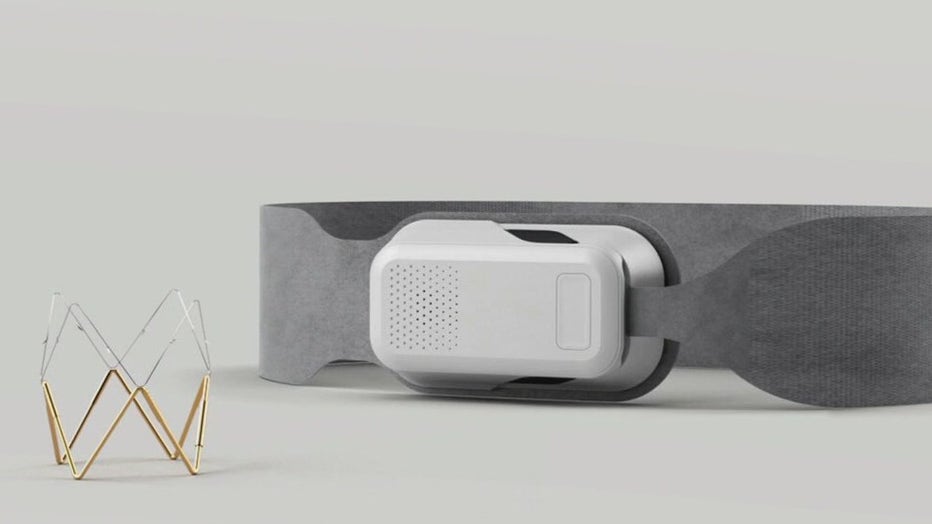New Fire 1 system aims to improve congestive heart failure treatment
AUSTIN, Texas - The Heart Hospital of Austin just wrapped up an initial study of a system that aims to improve the treatment of patients with congestive heart failure (CHF).
The study is testing the Fire 1 system for remote heart monitoring in patients with CHF, like 76-year-old Donna Whitworth of Austin.
Whitworth was diagnosed with CHF four years ago, caused by a leaking mitral valve. While doctors replaced that valve, she still deals with CHF and was hospitalized twice last April.
Fire 1 is a bendable, implantable sensor that’s inserted into the vena cava vein in the belly and then expands or collapses based on a patient's fluid status.

Fire 1 is a bendable, implantable sensor that monitors a patient's fluid status, then sends signals to the device worn around the waist that sends information to a Wi-Fi-connected computer. (Fire 1)
"I get very short of breath on exertion, when I’m retaining fluid. I can feel the fluid retention in my abdomen. Sometimes my legs, feet and ankles swell," Whitworth said. "Last spring, I was feeling very uncomfortable, very unsure about being able to stay out of the hospital. I don’t feel like that anymore."
Whitworth made history last June when the Air Force veteran and retired nurse became one of the first patients to take part in the Fire 1 study which began at the Heart Hospital of Austin before expanding to other locations.
MORE HEALTHBEAT
- Less sleep, higher risk for heart disease in women: study
- Heart disease is leading cause of death in men, women in Texas
- Toby Keith death: Austin surgical oncologist speaks on stomach cancer
"If we can consider our patients with heart failure to have a certain volume status – we want them optimized. We don’t want them to be congested, we don’t want them to be dehydrated. We want them as Goldilocks would say, "just right," said Dr. Kunjan Bhatt, cardiologist and heart failure specialist at the Heart Hospital of Austin.
Bhatt says Fire 1 is a bendable, implantable sensor that’s inserted into the vena cava vein in the belly and then expands or collapses based on a patient's fluid status.
If a patient is retaining fluid, the device expands and sends signals to another device worn around the waist that sends information to a Wi-Fi-connected computer which alerts doctors to any problems.
"If the patients are starting to build congestion, if the fluid status seems to be changing unfavorably, we would make a medication change then to get rid of fluid. And, that’s typically a water pill – we call them diuretics," said Dr. Bhatt. "This allows us to be proactive to avoid cyclical readmission problems that heart failure patients can have."
MORE HEALTH STORIES
- Wegovy weight-loss medication gets FDA approval for use as heart disease prevention drug
- Eli Lilly's Alzheimer's drug delayed by FDA: ‘It was unexpected’
- FDA clears use of first over-the-counter continuous glucose monitor
For Whitworth, who hasn't been hospitalized since getting Fire 1, it means peace of mind. "It’s very comforting to know that they’re watching me so closely and on an everyday basis," she said.
Dr. Bhatt says the initial study wrapped up in February with favorable results.
"It was a feasibility study to see if the device is doing what it’s supposed to do and is it safe," Dr. Bhatt said. "And, of course, both answers are true."
Whitworth says she's proud of being part of something that's potentially life-changing and life-saving.
"Well, I’ve got a pioneer spirit. And, I like helping people. I was a nurse for 30 plus years. So, to be able to do something that not only is helping myself, my own health but will help other people down the line, I like to do that," she said.
The device still has a few more trial phases to complete before it can apply for FDA approval, so at this time it’s not commercially available.

